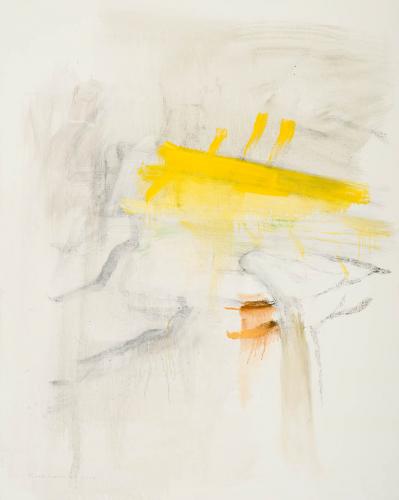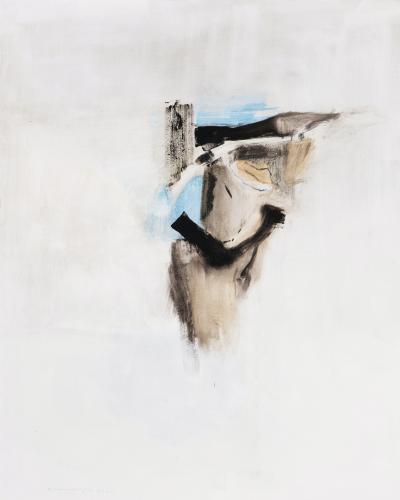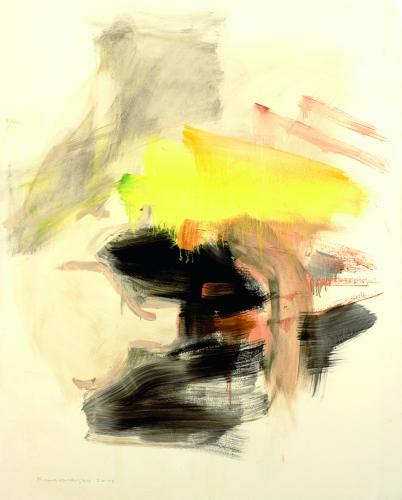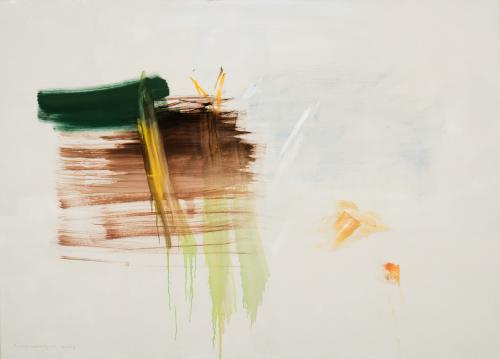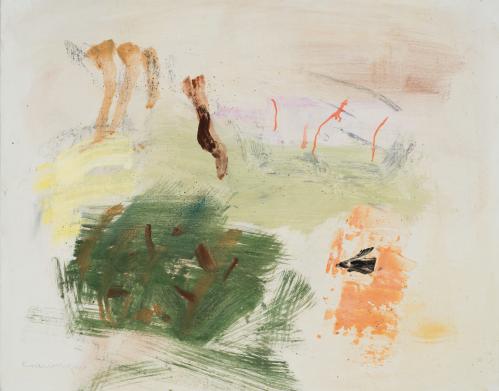
Peter Krawagna
Born in 1937, Peter Krawagna's creative work was primarily inspired by the 1950s. In the Post-War period the lens of modernism was focused, in terms of international attention, on developments in New York City. The Second World War had brought many leading artists to the city in exile from Europe, leading to a significant pooling of talent and ideas. Important Europeans that came to New York and provided inspiration for American artists included Piet Mondrian, Josef Albers and Hans Hofmann, who between them set the basis of much of the United States’ explosive cultural growth in the decades thereafter. Influential artists of the Abstract Expressionist Generation included Jackson Pollock (who innovated his famed drip, splatter and pour painting techniques), Willem de Kooning, Mark Rothko, Franz Kline, Barnett Newman, Clyfford Still and Adolph Gottlieb. It was a male dominated environment, though necessary revisionism of this period has highlighted the contributions of female artists such as Lee Krasner, Joan Mitchell, and Louise Bourgeois, amongst others.
At the start of the twentieth century, Austria was among the most pioneering and culturally progressive countries. It fostered important developments in the Arts and Crafts Movement and Art Nouveau, called Jugendstil in German, from around 1895 to 1910, forming a key bridge between the nineteenth century and the onset of modernism. This kind of progressive, avant-garde thinking led directly into the Viennese Secession movement, one of the key art and design movements of the early twentieth century. It was founded in 1897 by a group of Austrian painters, graphic artists, sculptors and architects, including Josef Hoffman, Koloman Moser, Otto Wagner, and Gustave Klimt, when artists resigned, en masse, from the Association of Austrian Artists in protest against its support for more traditional artistic styles and an exchange of ideas with artists outside Austria, disputing artistic nationalism, renewing the decorative arts and, most crucially, creating a "total art (Gesamtkunstwerk)" that unified painting, architecture, and the decorative arts. The group was fervently opposed to the domination of the official Vienna Academy of the Arts (the Vienna Künstlerhaus), and official art salons, with their traditional orientation toward Historicism. Ultimately the group broke apart, the decorative artists choosing instead to focus on a new guild called the Wiener Werkstatte.
In the late 1930s, Austria was annexed by the growing force of Hitler's Nazi Germany, an act known as the Anschluss, and which organised Austria into a province of a greater German Reich. During this period, like in Germany, the Avant-garde was labelled 'Entartete Kunst', translating to 'degenerate art', and was oppressed with only 'official' social realist art being approved, or even allowed by the state. Consequently, there was a noticeable exodus of creative talent who determined that their interests would be best served by relocating to London or New York. In the 20th century, important Austrian artists included Josef Hoffman, Gustav Klimt, Egon Schiele, Herbert Bayer (the typography and graphic design pioneer of the Bauhaus), architect and designer Josef Frank, Oskar Kokoschka, Alfred Kubin, Friedensreich Hundertwasser, Maria Lassnig, Hermann Nitsch, Arnulf Rainer, Franz West and Erwin Wurm.
EXHIBITIONS:
2013 Painting, Thomas modern, Innsbruck, Austria (solo)
2012 Galerie Amthof, Feldkirch, Austria (solo)
Gallery Unart, Villach, Austria (solo)
Peter Krawagna - Images 2010 - 2012, Hilger Modern, Vienna, Austria (solo)
2011 Focus: Abstraction. Works from the Essl Collection, Essl Museum, Austria
Reality and Abstraction 1 - Figurative and expressive art from 1980, Museum Liaunig, Austria
2010 Presentation Gallery Depelmann, Art Bodensee 2010, Gallery Depelmann Edition Verlag GmbH (solo)
Focus Collection 01. Painting and Drawing, Museum of Modern Art Carinthia, Austria (solo)
Presentation Gallery 3, Gallery 3, Viennafair 2010, Austria (solo)
Presentation Ernst Hilger, Art Cologne 2010, Gallery Ernst Hilger, Germany (solo)
2009 Peter Krawagna as a guest at D&S, Dorotheergasse 13/ corner Plankengasse - Hilger modern, Vienna, Austria (solo)
2008 19682008, Kunstverein Carinthia, Austria (solo)
68/08, Kunstverein Carinthia, Austria (solo)
K 08 :: Emancipation and confrontation. Art from Carinthia 1945 to the present day, Museum of Modern Art Carinthia, Austria (solo)
RED, Gallery 3, Austria (solo)
Peter Krawagna, Herbert Albrecht, Gallery Welz
Highlights from 20 years of artmark Gallery (Part II), artmark, Vienna, Austria (solo)
2007 Painting from 40 years, Künstlerhaus Wien, Vienna, Austria (solo)
2006 Gallery Rieder, Munich, Germany (solo)
Galerie Ernst Hilger, Vienna, Austria (solo)
2005 Biblioteca Provinciale, Benevento, Italy (solo)
2004 Gallery Ernst Hilger, Vienna, Austria (solo)
Change of view. From the collection no. 1, Museum of Modern Art Carinthia, Austria (solo)
Art in combination, presentation of a collection, Künstlerhaus, Vienna, Austria
Change of view, From the collection No. 1, Museum of Modern Art Carinthia, MMKK, Klagenfurt, Austria
2003 Silent Abstract, Gallery Hilger, Vienna, Austria
2002 Collecting out of passion. Examples of the Helmut and Norly Czerny Collection at the Neue Galerie Linz, Neue Galerie der Stadt Linz, Austria
Gallery Rieder, Munich, Germany (solo)
2001 Künstlerhaus, Klagenfurt, Austria (solo)
Art-House, Bregenz, Austria (solo)
2000 Palazzo Reale, Reggio di Caserta, Italy (solo)
1999 Africa, Galleria Art's Events, Torrecuso, Italy (solo)
Drawing. Austrian drawings of the 90s, Gallery im Traklhaus, Salzburg, Austria
1998 Gallery Depelmann, Langenhagen, Germany (solo)
Gallery Pudelko, Bonn, Germany (solo)
Gallery Carinthia, Klagenfurt, Austria (solo)
Painting and drawing, Kulturhaus, Graz, Austria
1997 From Africa, Rupertinum, Salzburg, Austria (solo)
1996 Galerie Contact, Vienna, Austria (solo)
Landscape, art, ecology, Kunstverein Hörn, Kunsthaus Horn, Austria
1994 Sweet Duration South, Künstlerhaus, Klagenfurt, Austria
Hommage ä Boeckl, Schloss Eberndorf, Carinthia, Austria
1993 Jungwirth. Krawagna. Ringel, Künstlerhaus, Klagenfurt, Austria
1992 Extracts, Kulturhaus, Graz, Austria
Nature/abstraction. Boeckl/Weiler/H ollegha/Krawagna, Carinthian State Gallery, Klagenfurt, Austria
1991 Decouvertes 91, Paris, France
1990 Art of the 80s, Neue Galerie, Graz, Austria
Three Austrians in Lyon, Gallery Athisma, Lyon, France
